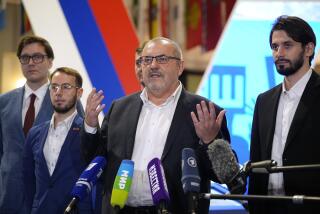Poland Expected to Elect Jaruzelski : He Decides to Run for President; Assembly Votes Today
WARSAW — Communist Party leader Wojciech Jaruzelski said Tuesday that he will be a candidate for the newly created office of president, virtually assuring his election today by the National Assembly.
Gen. Jaruzelski, 66, a career military officer, thus reversed his announcement of June 30 that he was withdrawing from the running. He cited “new facts” and “a sense of duty” as impelling him to stand for the presidency.
Among the factors that caused his change of mind, Jaruzelski said, was “the need for the preservation of continuity of the functioning of the state and concern expressed for its stability.”
“International aspects were strongly emphasized,” he went on. “It was commonly stressed that avoidance of responsibility in such a special moment would be in contradiction to the duties of a politician and a soldier.”
‘New Facts’
Among the “new facts” was a slow collapse of resistance to Jaruzelski’s candidacy among Communist Party allies in the National Assembly. In recent days, the Peasants’ Party and the Central Committee of the Democratic Party came out in support of the general after nearly two weeks of waffling.
The Communists and their allies have 300 of the 559 votes in the two-house National Assembly and should be able to elect Jaruzelski without help from the 259 members of Solidarity, the independent trade union movement.
The Communists won Solidarity’s agreement to have an open roll-call vote on the presidency in order to ensure party discipline. It was not certain whether Solidarity will instruct some its members to vote for Jaruzelski if the vote is close, but last week, Solidarity leader Lech Walesa--in a surprise public statement--said he was willing to work with Jaruzelski if he were elected.
“It is not the habit of parliamentary democracy that an opposition votes in the same way as the government majority,” Solidarity Sen. Karol Modzelewski said. However, Solidarity members could help Jaruzelski simply by not taking part in the voting, thereby reducing the needed majority.
Jaruzelski, when he announced his withdrawal, endorsed his interior minister, Gen. Czeslaw Kiszczak, for the post, and he suggested again Tuesday that the National Assembly turn to Kiszczak if his own candidacy should fail.
Kiszczak, however, has generated little enthusiasm in the Communist Party ranks, although Solidarity initially preferred him and Walesa actually endorsed him. Kiszczak had led the government side in the so-called round-table negotiations that led to Solidarity’s return to the political arena.
After Jaruzelski’s withdrawal, it became evident that the Communist Party saw Jaruzelski as a stabilizing force and as far more trustworthy than Kiszczak, whose genial demeanor with Walesa and the Solidarity leadership suggested weakness to a party faced with an uncertain future.
Over the past week, Jaruzelski met in closed sessions with each party organization, concluding Monday with a six-hour session with the Solidarity members of the National Assembly.
Cool Response
The Solidarity members, by and large, responded coolly to Jaruzelski, noting that he had failed to repudiate his 1981 declaration of martial law or Poland’s participation in the 1968 Warsaw Pact invasion that put down the “Prague Spring” reform movement in Czechoslovakia.
Jaruzelski and his supporters in the party believe that the declaration of martial law, at the height of the Solidarity crisis, saved Poland from Soviet military intervention.
Under the recently rewritten Polish constitution, the president may serve two six-year terms and will control Poland’s military and foreign relations--thus assuring, in the current situation, Poland’s continued close relations with the Soviet Union. Presumably, this is what Jaruzelski meant by his reference to the “international aspects” guiding his decision.
The president’s first order of business will be to appoint a prime minister, who will put together a government. The task is assuming growing urgency as the nation’s economic situation appears to be worsening steadily. The annual inflation rate is now estimated at 160%, and shortages are chronic.
Threat of Unrest
Meanwhile, bus and tram drivers in Katowice, a heavily populated industrial area in south-central Poland, went on strike Tuesday demanding higher pay.
The threat of renewed labor unrest is troubling to both Solidarity and the government, which has dealt with recent wage demands by quickly increasing wages and then printing more money.
The government has temporarily frozen wages and prices, mostly in an effort to curb a series of small wildcat strikes that began to sweep Poland in April and May. But the government has indicated that prices will soon be increased sharply.
Although no one is certain how the militant Polish labor force will respond, there is concern that a serious outbreak of labor unrest could threaten the first power-sharing arrangement in the East Bloc.
More to Read
Sign up for Essential California
The most important California stories and recommendations in your inbox every morning.
You may occasionally receive promotional content from the Los Angeles Times.










